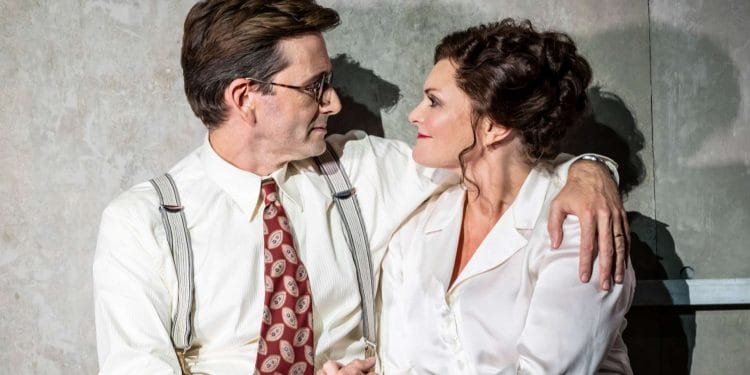When we look back at the most horrific events in history, we often wonder how on earth ‘good’ people could end up embroiled in the most heinous of situations, supporting despicable regimes yet believing they were on the right side of the argument. C.P. Taylor’s 1981 play, Good, now revived at the Harold Pinter Theatre following several pandemic delays, seeks to take us step by step through one man’s transformation from good to pure evil.
Whether John Halder (David Tennant) was ever a good man in the first place is certainly up for debate, but that’s how he presents himself anyway. This is pre-war Germany, and as a literary professor in Frankfurt, specialising in Goethe, Halder cares for his aging mother while trying to provide for his wife and children, whom he later leaves for a student.
His best friend is Maurice (Elliot Levey), the only Jewish voice in this play that charts the rise of Nazism, and while Halder initially speaks out against the rise of the Hitler, he eventually goes onto join the Nazis, misguidedly believing he can set them on a better path, only to become a full and high-ranking member of the SS.
Other characters weave their way in and out of Halder’s life; Sharon Small and Elliot Levey portray them all, with the three cast members remaining on stage throughout. It all moves quite quickly, rising and falling in pace like the various pieces of music Halder has heard in his head since Hitler came to power. It means Levey and Small have the unenviable task of switching characters at a moment’s notice, while the rest of us try to keep pace with Halder’s fragmented story.
While Levey and Small excel in the roles they embody, the constant switching doesn’t always work, and while the script, sometimes clumsily, tries to keep us on track with which characters the duo are portraying, it can become confusing. Equally, Halder’s internal monologue often overlaps with actual dialogue, adding another layer for the audience to decipher.
Dominic Cooke directs the play, which also launches his new production company. Sadly, it is all too clear to see why C.P. Taylor’s Good was ripe for a revival at this moment in time. The rise of Populism across the globe, and a return to war on the continent of Europe makes this chilling play even more shocking today.
It’s already a ‘small’ play in terms of the size of the cast, and similarly, The Harold Pinter is one of the West End’s more intimate houses, but Cooke makes the play all the more claustrophobic in the staging. This abstract approach looks good, and allows us to focus on the performance, but it does come with some jarring sound design, that sees sound effects being used to compensate for the lack of props.
Tennant’s performance is terrifyingly magnificent; never missing a beat, Tennant keeps the audience enthralled, continually shocking us in the cool detachment with which he delivers some of the most chilling lines.
C.P. Taylor’s Good demonstrates just how easily the masses can be manipulated by the targeting of individual character flaws. The script, aided by Tennant’s performance, leaves its audience reeling and questioning just how clear cut the line is between good and evil.


















Comments 7